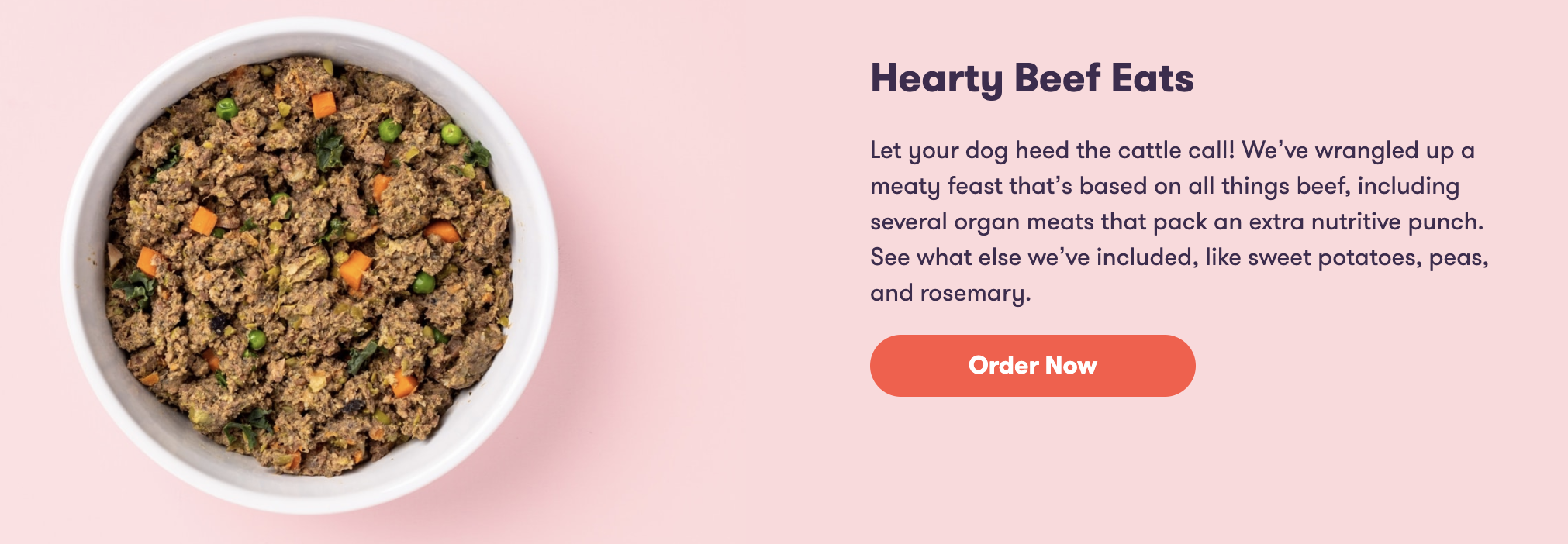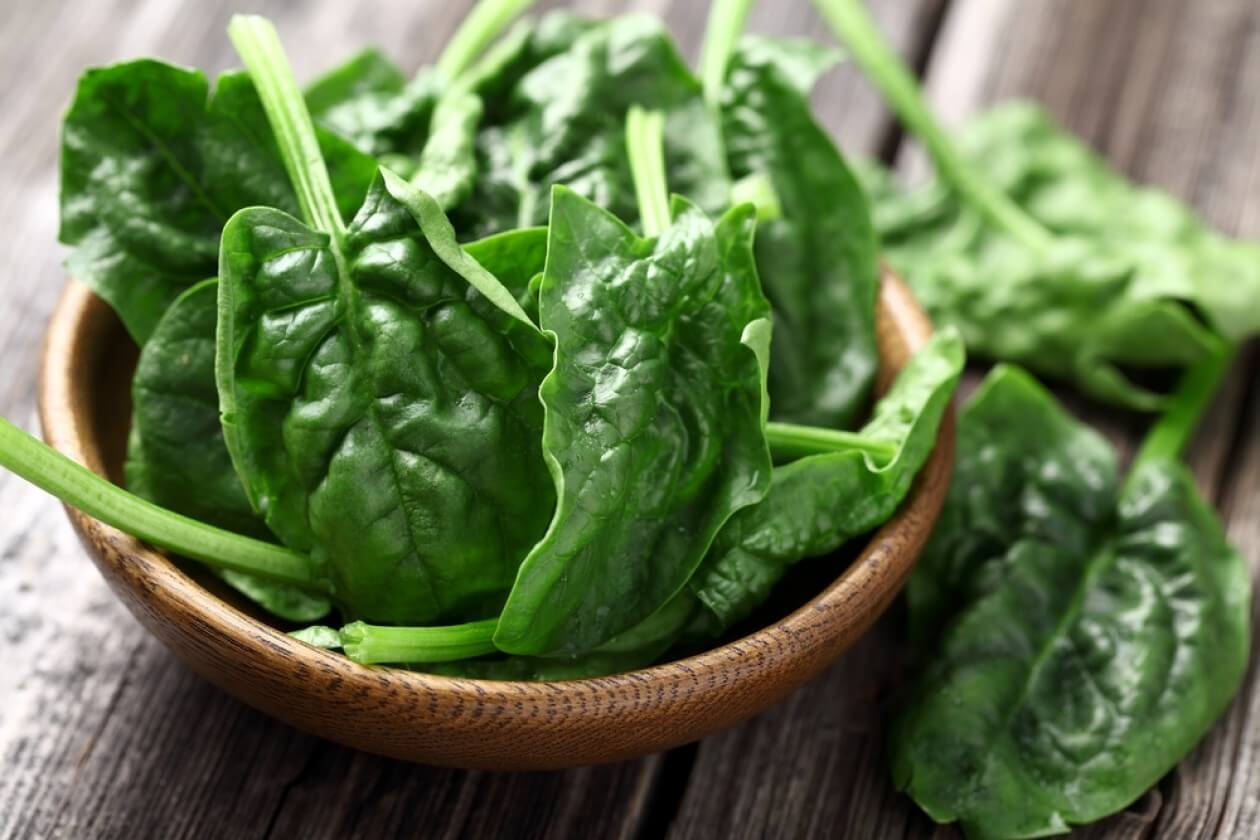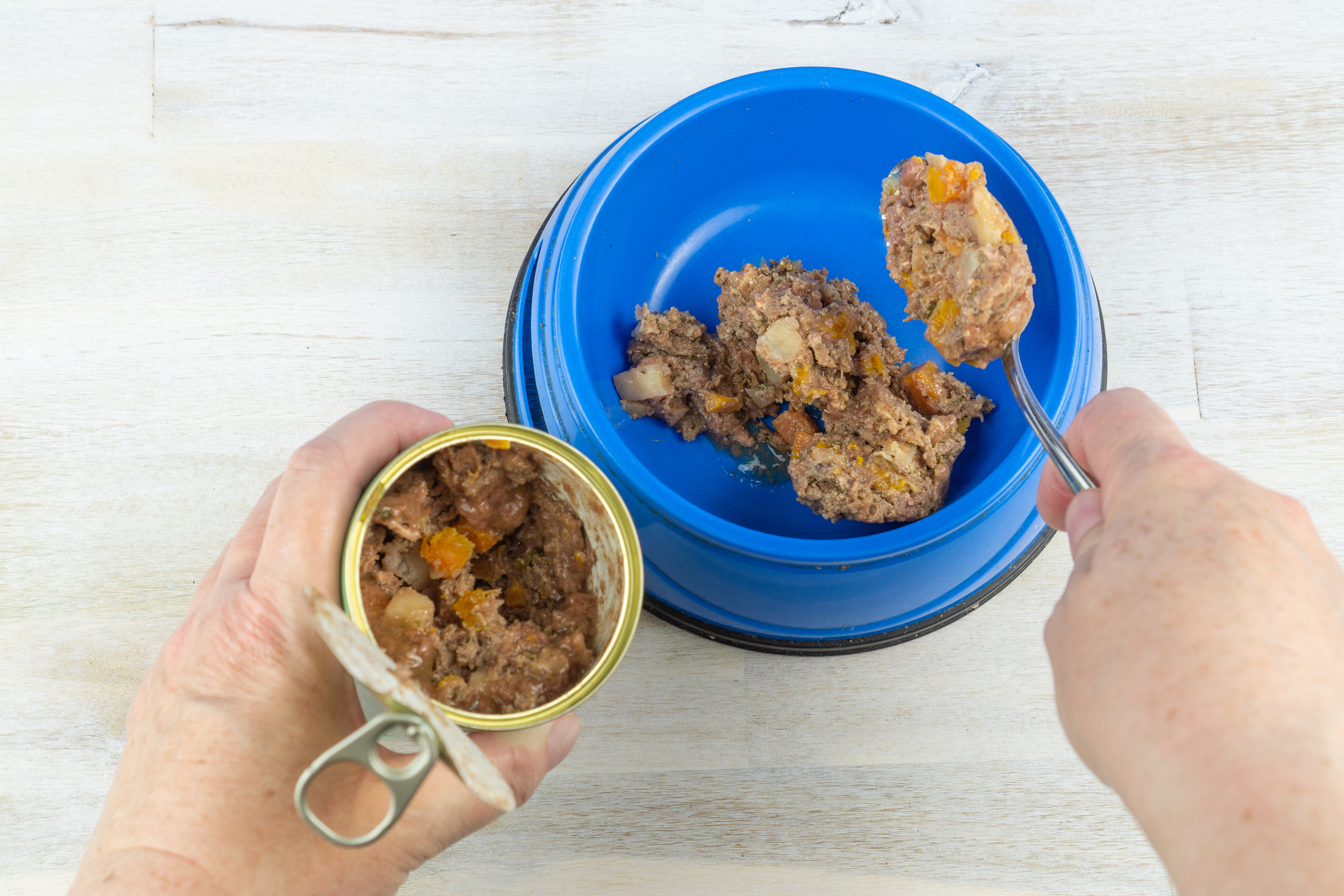Hey Ollie blog readers! We’re offering you an exclusive 60% OFF your starter box! Try now!
Spinach, the leafy vegetable that loves to get stuck in between your teeth is making a strong case for getting stuck in your dog’s teeth too. You might be surprised to learn that it packs a big punch in terms of health benefits for pups, and is especially unique in its diversity of essential and non-essential (but still super good-for-them) nutrients. Learn about why you should think about sharing spinach with your pup and how to do it in a way that is safe and delicious.
Can Dogs Eat Spinach?
Yes, dogs can eat spinach in moderation! This leafy green is packed with essential vitamins and minerals, including vitamins A, C, and K, iron, and antioxidants that help support your dog’s immune system, vision, and overall health. The fiber in spinach also promotes good digestion and can contribute to a healthy weight.
However, while spinach is nutritious, it contains oxalates—compounds that can interfere with calcium absorption and may contribute to kidney stone formation if consumed in large amounts. For this reason, spinach should be an occasional treat rather than a daily staple. Always introduce spinach gradually and monitor your dog for any signs of digestive upset.
When feeding your dog spinach, opt for fresh, organic leaves whenever possible. Avoid spinach that has been cooked with butter, salt, garlic, or other seasonings, as these additives can be harmful to dogs.
Health Benefits of Spinach For Dogs
It helps with eye health.
Spinach contains a class of fat-soluble pigments called carotenoids, namely lutein, zeaxanthin and chlorophyll. These give spinach leaves that vibrant green color and have been shown to support healthy eyes, particularly their ability to interpret light and dark, which becomes especially important as dogs age.
Fights free radicals.
Spinach is rich in anti-inflammatory properties and antioxidants, which buffer cells from the damage of free radicals—those highly reactive molecules in the body that weaken and wear out cells, speeding up the aging process and leaving weakened cells vulnerable to disease.
Gets the blood pumping.
Spinach boasts high levels of vitamin K, which is an important player in keeping blood cells healthy, particularly in blood’s ability to clot normally. Vitamin K also helps support strong bones and heart health.
May prevent cancer.
If you have a dog who’s breed is prone to certain cancers, adding spinach to their diet could be a good idea. Spinach has long been touted as a cancer preventer for humans, but new studies suggest that it can also aid in fighting cancerous tumors in animals. Researchers believe the rich supply of vitamins, minerals, omega-3 fatty acids, antioxidants, and phytonutrients do the job. The folate in spinach also helps the body produce new cells while repairing DNA.
Packed with vitamins and minerals.
While the vitamins and nutrients in spinach get most of the accolades, this veggie also contains some impressive trace minerals like copper (associated with red blood cell production) and magnesium (a necessary cofactor in cell performance and energy production). That’s right, the more in your dog’s teeth, the better. Just be sure to let him know before he heads out on a date. Also, he will need to actually digest all these leafy greens to get all of these great benefits!
Ollie Dog Food Recipes With Spinach
At Ollie, we use real, high-quality ingredients to create balanced meals for your pup—including nutrient-packed spinach! This leafy green is rich in vitamins, minerals, and antioxidants that support overall health. You’ll find spinach in several of our fresh recipes:
- Fresh Beef Recipe with Sweet Potatoes – This hearty meal is packed with protein from fresh beef, fiber from sweet potatoes, and a dose of spinach for extra vitamins and minerals. It’s a well-rounded option for pups who love a meaty, nutrient-dense meal.
- Fresh Chicken Recipe with Carrots – Lean chicken provides high-quality protein, while carrots and spinach add natural sources of fiber, antioxidants, and essential nutrients to support digestion and immune health.
- Fresh Turkey Recipe with Blueberries – A delicious mix of lean turkey, antioxidant-rich blueberries, and nutrient-dense spinach makes this a great option for dogs who need a flavorful and balanced diet.
- Fresh Pork Recipe with Apples – This recipe combines savory pork with naturally sweet apples and spinach to create a meal that’s rich in protein, vitamins, and fiber—perfect for keeping your pup happy and healthy.
Each of these meals is crafted with fresh, human-grade ingredients to ensure your dog gets the best nutrition in every bite!
Is Spinach Safe for Dogs?
Yes, spinach is generally safe for dogs when fed in moderation. It provides a wealth of essential nutrients, including vitamins A, C, and K, as well as iron, fiber, and antioxidants that support overall health. However, there are some precautions to keep in mind before adding spinach to your dog’s diet.
Spinach contains oxalates, natural compounds that can interfere with calcium absorption and may contribute to kidney stone formation in some dogs, particularly those with pre-existing kidney issues. While small amounts of spinach are unlikely to cause harm, excessive consumption over time could lead to health concerns.
To ensure spinach is safe for your dog:
- Serve it in moderation – A few leaves as an occasional treat are fine, but avoid making it a daily staple.
- Cook it lightly – Steaming spinach helps reduce oxalate levels while preserving nutrients.
- Avoid added ingredients – Never serve spinach with butter, garlic, salt, or other seasonings that could be harmful to dogs.
- Monitor for reactions – If your dog experiences digestive upset or any unusual symptoms after eating spinach, discontinue feeding and consult your vet.
For most dogs, spinach can be a healthy and beneficial addition to their diet when prepared correctly. If your pup has kidney disease or other underlying health conditions, check with your veterinarian before offering spinach to ensure it’s a safe choice for them.
How to Prepare Spinach for Dogs
The best way to serve spinach to your dog is fresh, steamed, or lightly cooked without any added seasonings. Here are a few preparation tips to ensure your pup gets the most benefits:
- Wash Thoroughly – Always rinse spinach leaves under water to remove dirt, pesticides, or chemicals that may be harmful to your dog.
- Chop or Puree – Cutting spinach into small pieces or blending it into a puree makes it easier for dogs to digest and absorb the nutrients.
- Steam or Blanch – Lightly steaming spinach helps break down oxalates while preserving nutrients, making it a safer and more digestible option.
- Mix with Regular Food – You can mix small amounts of spinach into your dog’s regular meals or alongside Ollie dog treats for an added nutritional boost.
- Serve in Moderation – A few spinach leaves occasionally are fine, but avoid overfeeding to prevent potential calcium absorption issues.
Always consult your veterinarian before adding spinach to your dog’s diet, especially if they have kidney problems or other underlying health conditions.
When should you avoid offering spinach to your dog?
The AKC warns pet parents that Spinach is high in oxalic acid, which blocks the body’s ability to absorb calcium and can lead to kidney damage. They also note that your pup would have to eat a LOT of spinach in order for this to happen. If you are feeding in moderation, you should not have a problem. If you have a pup with a history of kidney issues, consult your vet before offering spinach to your dog. As the amount that is considered a lot can vary across different breeds, you may also want to consult your vet about the appropriate serving size and frequency that will be best for your pup. As with any new food, starting slowly and working up to the optimal serving size is a good idea.
How do you actually get your dog to eat spinach?
Some pups might gobble up raw spinach and think it is a delicious treat. Others may turn up their noses at it. If you want your pup to try some spinach and they fall into the latter group, you might have to get a little creative if you want your pup to eat their veggies.
When feeding spinach to your dog, remember to chop it first. This will make it easier to digest. The healthiest way to feed spinach to your pup is steamed. You want to avoid sauteeing the spinach in oil. While it may add some flavor, it will also add fat and calories. Also, do not add salt or other seasonings to the spinach. Your pup likely doesn’t need the sodium and garlic or onions in a seasoning blend might make your pup sick.
If plain steamed spinach is still not enticing to your pup, you can try baking some treats at home. This recipe for carrot and spinach treats is grain-free and made with protein-rich nut butter and almond flour.
Since baking for your pup isn’t for every pet parent, you can also purchase treats with spinach already baked in.

However you serve it, you can feel good about adding some spinach to your dog’s diet and helping them reap the benefits of this leafy green. Sharing food can be a great bonding experience for you and your pup, especially if you both get some spinach in your teeth! Don’t forget to take a selfie with your spinach smiles.
The Ollie blog is devoted to helping pet parents lead healthier lives with their pups. If you want to learn more about our fresh, human-grade food, check out MyOllie.com.
Tagged As:

The nutrition your dog needs,
the food they want.

Enjoying our articles? Subscribe our Newsletters and get new articles directly to your inbox
You might also like
18 August 2025
3 MINS READ
5 Risks of Canned Dog Food Pet Parents Miss
While canned dog food might seem like a convenient choice for your pup, it carries several hidden risks that could impact their health. Understanding these concerns will help you make better decis…
by Ollie Pets
18 August 2025
6 MINS READ
What Pet Parents Need to Know About Extruded Kibble
Not all dog food is created equal. When choosing a diet, it’s important to consider how the way your dog’s food is made impacts their overall health and nutrition. Understanding the manufacturin…
by Ollie Pets
18 August 2025
9 MINS READ
Nourish Skin from Within: Fresh Dog Diet Benefits
If your dog is constantly scratching, licking their paws, or has a dull, flaky coat, it’s not just frustrating—it could be a sign that something’s off in their diet. Skin and coat issues are som…
by Ollie Pets







